Lesson Notes for Class 6 Third Language English in Karnataka PART- 1

Introduction
In the culturally diverse state of Karnataka, learning English as a third language is an essential part of a student’s education. English serves as a bridge language that connects students from various linguistic backgrounds and prepares them for a globalized world. In this blog post, we will explore the lesson notes for Class 6 third language English in Karnataka, highlighting the significance of this subject and its curriculum.
Importance of Learning English
1. Global Communication: English is considered the global lingua franca. Learning English opens doors for students to communicate with people from all over the world, making it a crucial skill for the 21st century.
2. Career Opportunities: Proficiency in English is often a requirement in many job sectors. It enhances job prospects and career growth, enabling students to be competitive in the job market.
3. Access to Knowledge: A significant portion of the world’s knowledge, including literature, science, and technology, is available in English. Learning the language grants access to this vast repository of information.Lesson Notes for Class 6 Third Language English
The Class 6 third language English curriculum in Karnataka is designed to provide students with a strong foundation in English language skills. It focuses on developing their listening, speaking, reading, and writing abilities. Here are some key lesson notes for Class 6:
1. Introduction to Basic Vocabulary: Students are introduced to basic English vocabulary, including common words and phrases. They learn to identify and pronounce words correctly, building their vocabulary progressively.
2. Grammar and Sentence Structure: The curriculum emphasizes the importance of proper grammar and sentence structure. Students learn to construct sentences using appropriate tenses, subject-verb agreement, and word order.
3. Reading Comprehension: Students are exposed to age-appropriate texts and stories. They practice reading comprehension, where they read passages and answer questions to assess their understanding of the material.
4. Listening and Speaking Skills: Listening and speaking exercises are an integral part of the curriculum. Students engage in conversations, listen to audio clips, and develop their listening and speaking skills to enhance their communication abilities.
5. Creative Writing: To foster creativity and expression, students are encouraged to write short essays, stories, and poems. This helps them become proficient in expressing their thoughts and ideas in English.
6. Cultural Awareness: The curriculum also includes lessons on English-speaking cultures around the world, fostering cultural awareness and understanding.
7. Assessment and Evaluation: Periodic assessments and evaluations help teachers gauge students’ progress, and students receive constructive feedback to improve their language skills.
LESSON NOTES CLASS-6 PART- 1
| Lesson | Download Link |
|---|---|
| 1)In A Vegetable Shop | Click Here |
| Water | Click Here |
| 2)Haldi’s Adventure | Click Here |
| School is a place of pleasure | Click Here |
| 3)Nine little Birds | Click Here |
| Family first | Click Here |
| 4)Charity | Click Here |
| A Little World | Click Here |
| Lesson | Download Link |
|---|---|
| 1)The Bell Of Justice | Click Here |
| 2)Miriam and Moses | Click Here |
| 3)Angulimala | Click Here |




